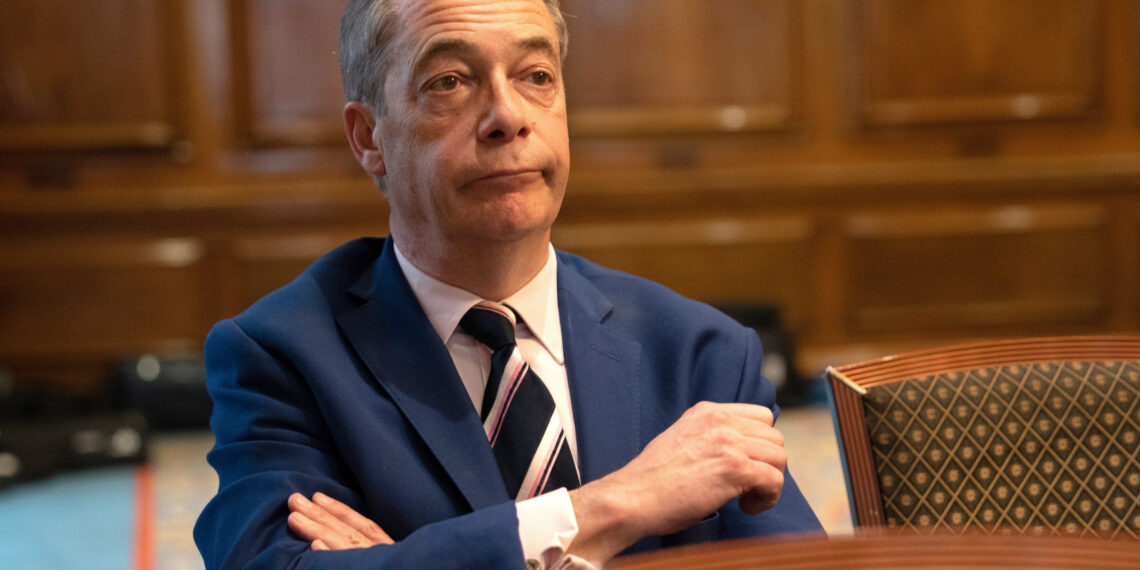by Will Jones, Daily Sceptic:

One could be forgiven for thinking there’s a secret blacklist somewhere, and that Nigel Farage and his family are on it. Increasingly, people and organisations who don’t think the right way are being refused service by their bank – or in Farage’s case, eight banks. The targets have included those associated with UKIP and the Brexit Party (including two former MEPs), Laurence Fox’s Reclaim Party, Wings Over Scotland, a Church of England vicar – and probably many more that we don’t know about.
TRUTH LIVES on at https://sgtreport.tv/
But I don’t agree with Mr. Brexit’s hypothesis that this happened to him because he’s a “politically exposed person” – he doesn’t meet the definition. In my view, this “cancellation” is a political attack that signals the left-wing/woke blob’s capture of the banking system – a new and very dangerous phase of the culture war where everything including one’s ability to pay the rent is under threat.
As evidence of this general trend, last year PayPal tried to cancel Toby Young, the Daily Sceptic and the Free Speech Union (before reversing course under considerable pressure), but it’s worth remembering some of the other victims: the children’s rights group UsForThem, Gays Against Groomers, the gender-critical evolutionary biologist Colin Wright, alternative news site The Exposé, the conservative group Moms for Liberty, socialist outlets Consortium News and MintPress News, the UK Medical Freedom Alliance, Left Lockdown Sceptics and Law or Fiction, as well as probably many more who either don’t have the clout to draw attention to their plight, or who decided it was best to keep quiet.
The above people and organisations have expressed views that are gender-critical or anti-lockdown, or which don’t fit the narrative on Ukraine. To adopt any of these is to make make one an enemy of the woke blob. But particularly irritating for me, in this respect, is Chris Bryant’s claim last year in the House of Commons that Nigel Farage took £548,573 from RT (formerly Russia Today) in the 2018 calendar year – which may have been the pretext for his banking cancellation.
On this point, it probably won’t surprise readers to know that (besides writing articles on the topic) I wear a pro-Ukraine lapel pin, have a set of “Russian warship, go f— yourself” stamps and other pro-Ukraine artwork framed on my walls, sometimes wear a Zelenskyy-style trident sweater, teach English to Ukrainian soldiers and veterans and support other pro-Ukrainian charities. From the comfort of my own home, I’m pretty much all-in when it comes to Ukraine. If they were a football team, I’d have a season ticket. So I’m predisposed to have deep suspicions about anyone who has appeared on RT (as Nigel Farage has done) or who trots out the usual excuses for the invasion (as Nigel Farage has done), but I’m calling bulls—t on Chris Bryant’s allegations.
The fact that these allegations were made in the chamber of the House of Commons, taking advantage of parliamentary privilege to make a defamatory allegation about an individual who, by virtue of parliamentary privilege, isn’t able to take legal action to defend his reputation, is a disgrace. The last time someone did that, it didn’t work out too well – although like Tom Watson, it probably won’t stop Chris Bryant from getting a peerage. However, the reason he did it is because, like Harry Reid, he knows it can be effective. And the reasons I don’t believe Bryant are because: (a) I think Nigel Farage is an honourable person; (b) because RT wouldn’t pay someone half a million pounds unless they were on screen almost constantly (and Farage denies appearing on RT at all in 2018 – a claim that could easily be challenged if it were false); and (c) because if Bryant had any evidence to back up his allegations, he’d have made them outside parliament instead of hiding behind parliamentary privilege. The coward! And also, I think Farage could beat him in a cage fight.
However, these are side-issues. The ability to have a bank account is about as necessary for modern life as electricity or running water. I could make legal arguments dating back to the 17th Century Lord Chief Justice Sir Matthew Hale and his De Portibus Mari, or by referring to modern-day legal scholars. But the simple fact is that we all need access to certain things like telephones, the internet, roads and railways, etc. And I don’t need to resile from a pure free market position to say that when banks act in concert – presumably influenced by governmental or quasi-governmental organisations in some way – to deny a service on apparently political grounds, this becomes a matter “affected with the publick interest”.



